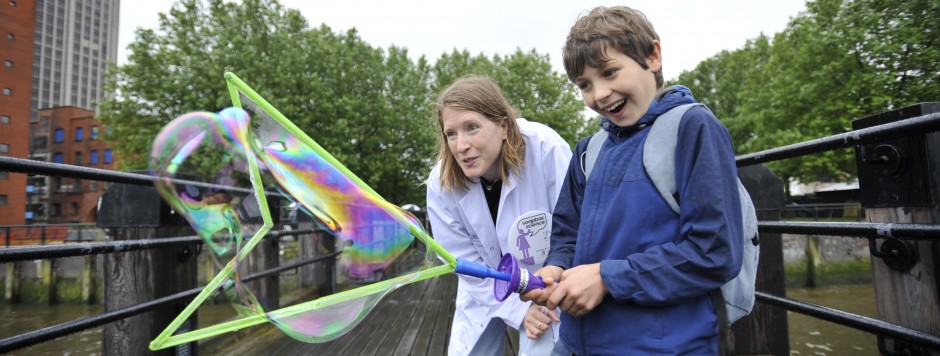 Dr Michelle Hulin (@michhulin), NIAB EMR, will be taking part in Soapbox Science Canterbury 2018 on 23rd June, giving a talk entitled “Hop, skip, jump: How bacteria evolve to infect new plant species”
Dr Michelle Hulin (@michhulin), NIAB EMR, will be taking part in Soapbox Science Canterbury 2018 on 23rd June, giving a talk entitled “Hop, skip, jump: How bacteria evolve to infect new plant species”
SS: How did you get to your current position?
MH: I am currently a postdoctoral researcher. To get here, I first did a BSc degree in Biology at the University of Bath. I had the opportunity to undertake a summer research placement in the university molecular biology labs during my second year working on molecular detection of spoilage yeast. In my third year I transferred these skills to work on detection of Fusarium wilt oil palm disease for my dissertation. These experiences and the supervisors convinced me that I would really like to continue working in science, so I applied for a PhD at the University of Reading/NIAB EMR, supervised by Prof Robert Jackson, Prof John Mansfield and Dr Richard Harrison. This was looking at the evolution of pathogenicity and host specificity of bacteria on cherry trees. I aimed to understand what genes allowed the bacteria to cause disease. In my final year of my PhD I helped write a research grant to continue my current research. I am employed as a post-doctoral researcher at NIAB EMR working on this grant. My main interests are bacterial genetics and evolution, combining molecular biology with bioinformatic analysis. I’d like to apply these skills to other important bacterial plant diseases.
SS: What, or who, inspired you to get a career in science?
MH: I really enjoyed studying biology at school and university. Science is a very rewarding and interesting career path as you can put your all into trying to understand the world around you. During university, I enjoyed microbiology courses and studying the interactions between microbes and higher organisms such as plants and animals. I was interested in what drives some microorganisms to become pathogenic. I also enjoyed plant science modules, so brought the two interests together to study plant pathology in my PhD.
SS: What is the most fascinating aspect of your research/work?
MH: The part of my work that I find most fascinating is how bacteria can rapidly evolve to adapt to their environmental conditions and how they interact with plants. These interactions are often called an arms-race where the pathogen and plant species are constantly evolving to overcome the other. Our work on cherry pathogens, has shown that these bacteria have gained and lost multiple pathogenicity genes during their evolution and that this has helped them adapt to cause disease towards this particular host plant. Some of these important genes have been gained on plasmids which are small circular pieces of DNA that bacteria can transfer to each other, whilst another important gene has been gained within a bacteriophage sequence (a bacteria-infecting virus).
SS: What attracted you to Soapbox Science in the first place?
MH: I really want to engage more with the public about science, I think it is important to share our findings and improve trust in science. I’d like to inspire young biologists to study plant pathology as this is an area of key importance for future food security and we do not want there to be a generational gap in experts in this area. You can study fundamental questions about evolution and ecology using plant-microbe systems making them just as interesting as human and animal pathogens!
SS: Sum up in one word your expectations for the day
MH: Rewarding
SS: If you could change one thing about the scientific culture right now, what would it be?
MH: I would like to improve the way science is communicated to the public. There is a lot of mistrust in science such as fears of genetically modified food and doubts about climate change. Science is often misconstrued and over-hyped by the media and it seems that every food item can cause or prevent cancer leading to a lot of confusion! I would really like there to be more training on scientific communication from schools upwards.
SS: What would be your top recommendation to a woman studying for a PhD and considering pursuing a career in academia?
MH: Don’t be afraid of failure, science doesn’t always answer your questions straight away and often experiments will not work. Do the science that you enjoy doing and present it to others with pride!
